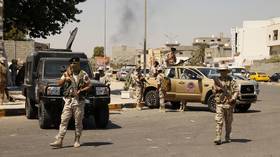Libyan military launches major operation against rebels
The Libyan National Army has mounted air strikes and an airborne assault on insurgents from neighboring Chad
The Libyan National Army (LNA), representing one of the country’s major factions led by Field Marshal Khalifa Haftar, has launched a large-scale military operation to push back Chadian rebels.
In a statement on Friday, the press service of the LNA’s General Command said that air forces had bombed rebel gatherings in the southern part of the country bordering Chad. It added that, in a bid to secure the border, Haftar’s forces had also launched an airborne assault in the wake of the strikes.
Commenting on the development, army spokesperson Ahmad Mismari stressed that the LNA won’t allow Libya to be a springboard for any armed formations that “pose a threat to our neighbors or a launching pad for any illegal actions,” without clarifying to which groups he was referring.
The LNA claims to have targeted a housing complex in Umm al-Araneb in the southern Murzuq district, where more than 2,000 homes under construction have been seized by rebel fighters. It also noted that regional tensions have made the security situation in many parts of North and West Africa increasingly fragile, which has empowered local terrorist and criminal groups.
The LNA raised these concerns after the Economic Community of West African States (ECOWAS) threatened a military intervention in Niger to restore to power President Mohamed Bazoum, who was ousted in a coup last month.
Meanwhile, earlier this month, Mahamat Idriss Deby, the transitional president of Chad, visited the border with Libya amid reports of attacks by the Libya-based Military Command Council for the Salvation of the Republic (CCMSR), a Chadian rebel group seeking to overthrow the government that has also clashed with pro-Haftar forces in the past.
In addition to this, earlier this week, Deby announced that Chad’s army was once again fighting The Front for Change and Concord (FACT), another Libya-based militant group hostile to the government in N’Djamena, after it quit a ceasefire.
Libya has been a hotbed of instability since 2011, when a NATO-backed coup deposed its leader, Muammar Gaddafi, who was later murdered. The ensuing civil war has effectively torn the country into pieces controlled by rival factions. However, in 2020, the LNA and the Tripoli-based Government of National Accord (GNA) signed a UN-mediated “permanent ceasefire.” The agreement, however, has been marred by repeated delays in holding elections in Libya, which has threatened to reignite the conflict.
You can share this story on social media:








Comments are closed.